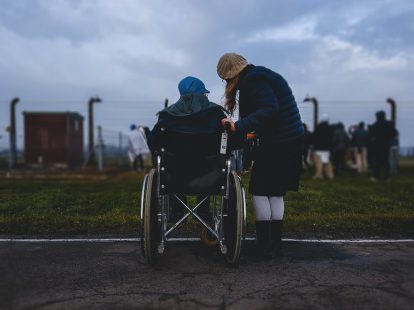

In world of ‘social distancing’, what is the New Normal for Care and Connectivity?
As streets around the world, which usually hum with activity, continue to fall silent in the face of the Covid-19 pandemic, we are all witnessing our lives change rapidly; taking on new forms, shapes, places and meanings. We know that culture is constantly changing, but what makes this event more remarkable is that we are not only seeing change at an unprecedented rate and far reaching depth, but those who are not changing are being met with bemusement, at best, and even outright hostility in many cases.
Tensions are mounting as our social fabric frays. In Brooklyn, these folks in apartment windows got in a shouting match with those down on the street. “Flatten the curve, go home,” one chants. #coronavirus pic.twitter.com/XjYQDewnaT
— Nick Brown (@NickPBrown) March 15, 2020
Over the coming weeks Space Doctors will be tracking these rapid cultural changes, exploring how they cast a new light on how we will live our everyday lives. Fundamental ideas like how we greet each other, that we held to be quotidian and even part of our cultural identity are being rapidly reframed as we are forced to relate to each other, both locally, as a community and globally, in new ways.
Because despite the tragedy that is besieging the globe, cultural change is accelerating, and we are being forced to reconsider all those rhythms and systems that we thought were the norm and that we thought were good enough.
In this tumultuous time, we need to anticipate A New Normal.
The language of the pandemic highlights an area in which the most change is demanded and felt. ‘Social distancing’, self ‘isolation’, ‘work from home’ are all terms that emphasise a withdrawal from society, a retreat from participation. We are threatened with language of loneliness and the realities of our situation present the very real risk of people falling through the gaps, something that we all need to be aware of and active in our efforts to prevent.
This begs the question, what does care and connection mean in a world where we are tasked with reducing our exposure to others?
Although the changes that we’re all being asked to make feel daunting, the reality is that we are all well practiced in communicating through a mask, through layers of media that have long facilitated a new intimacy. What is clear is that the immediate response to isolation is a greater connection to others and to culture more widely. In times of stress, we seek hope, reassurance and comfort through humour, not social distance.
In China, over 400 million people tuned into live streamed DJ sets and ‘cloud clubbing events’ and museums opened their digital doors to invite people in. It isn’t just social and cultural connection that is expanding; even the windows on our conference calls to our colleagues have become more intimate, with domestic backgrounds replacing the dingy, heartless call pods that previously housed the connection to our colleagues around the world.

But it is not just digital connection that is bringing us closer to our world. A consequence of isolation is that we are more exposed to our immediate geographical communities. From seeing new faces in windows that were previously empty throughout the day, to the sounds of communal singing in blocks from Italy to Wuhan our world is blurring with the worlds of others, and even if we can’t shake their hands, we can smile at them through the distance that is currently uniting us.
Grassroots organisations and volunteers are creating means by which to extend care to those in communities, providing services that have been disrupted by our situation, those that, whether we like it or not, our governments cannot provide. Community WhatsApp groups and leaflets, designed to connect neighbours and offer help, are increasingly common as people look for opportunities to help, to care for their neighbours and connect with each other.
Rebels,
Now is the time to use our numbers and skills to support our communities. If you wish you can print off the below to post through doors on your street,
Rooted in love.
We are all we need💚(Remember to wash your hands before handling and take all sensible precautions) pic.twitter.com/9L5IRasVTJ
— Extinction Rebellion UK 🌍 (@XRebellionUK) March 15, 2020
For business, this means that we all have a responsibility to facilitate this connection and provide opportunity for care. It is clear that people do not want emails explaining how brands are concerned about the pandemic – they want action. They want resources channelled to where they are needed, they want reassurance that their colleagues will be paid if they are forced not to work, they want business to protect our society and to take the action to facilitate this new culture of connection that we have found ourselves in.
As terrifying as the challenge facing us is – the reality is that we will all play a part in shaping what our ‘new normal’ becomes. We have a collective responsibility to make this new world one which has learnt from the unintended consequences of the past, to start building a better normal today.
For more like this straight to your inbox, sign up to our newsletter.